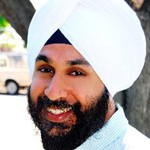The immediate of the reaction of the community, while certainly is nervousness, I don’t think will deter people from going and continuing on with their prayer.
Kim: Are tragedies like this renewing calls for the community to reach out and do more education about what the faith is?
Dhillon: Sikhism has an interesting challenge because it’s a non-proselytizing religion. We don’t go after converts. And so as a result of that we don’t really have a very strong effort or history of defining ourselves to other people. We believe all religions are equal. So we don’t do a very good job of marketing ourselves. This misguided anger, anxiety, aggression towards members of our community is primarily because no one ever learned about us in school. I think you’ll see in the next few months and years a much greater effort to reach out and engage, to help address some of those misconceptions.
Kim: Do you feel like before the weekend tragedy, that there was a sense in the community that things had died down some, and that the community was not in that kind of danger and that this is renewing fears?
Dhillon: Our biggest challenges over the last decade have been around transportation, safety and security. Our human rights organization have been grappling with job discrimination and the challenges of being a traveler as a Sikh. We get stopped. I’m at the airport right now, I’m going to be having a challenge getting through security. So those are the types of things that we’ve been dealing with, which is being singled out for our identity. Certainly I expect there will be a renewed interest in community safety and security, whereas over the last couple of years I think we had been focused a little bit less on that.
Kim: Details of the shooter that are emerging, of Wade Michael Page, include that he was the leader of a white supremacist music band, so suggesting that he might have misidentified Sikhs as Muslims, it does point to that. In talking with other local leaders today, one thing that they made clear to me was a desire to clarify that Sikhs are not Muslim.
Dhillon: It’s a very difficult position to be in, right? When you’re misidentified, that’s one problem, when you’re misidentified and targeted, that’s a different problem. But the bigger issue is that no one should be targeted.
Kim: The temples that you worship in, do you know if they have stepped up security?
Dhillon: We’ve been traveling, so I’m not entirely sure. I am in North Carolina right now, where my family is. They have not made any specific security efforts. They’re holding a candlelight vigil this week, and they’re having an open langar, which is a community lunch, on Sunday, for anybody in the community; anybody and everybody who wants to come. So as opposed to being more secure and shut down, the community itself is opening its arms more than they have in the past, to accommodate all the wonderful well wishes that our community has received, from people who understand how tragic and inappropriate what happened yesterday was.
Kim: Are you feeling any differently today as you travel here to Northern California?
Dhillon: I was born and raised with a turban on my head, and I have every expectation that I look different. I think people will judge me by my actions, and I hope the actions of others who are completely not related to me or what I do, won’t make it more difficult for me to do what I think is important for me in my life.
